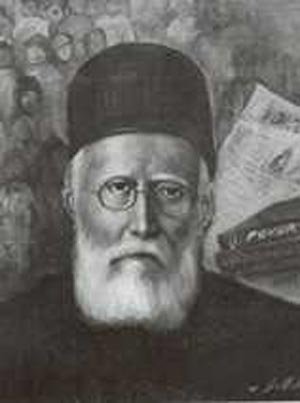
Dadabhai Naoroji helped lay the foundation of India’s contemporary freedom struggle. At a time when the East India Company had systematically dismantled the nationalistic co- operation between the princely states of India, rose to prominence Dadabhai Naoroji, a peerless patriot who defined the modern Indian freedom struggle Dadabhai was born on September 4th, 1825 to a poor Parsi family in Bombay. His father, Naoroji Palanji Dordi, died when Dadabhai was only 4 years old. Dadabhai was brought up by his illiterate mother Maneckbai who gave Dadabhai the best English education possible.
As a student, Dadabhai had a knack for mental mathematics and went on to distinguish himself in Mathematics and English at the Elphinstone Institution (now College) in Bombay.
On completion of his education, Dadabhai was appointed the Head Native Assistant Master at the Elphinstone Institution and went on to become the first Indian Professor of Mathematics and Natural Philosophy.
Dadabhai entered the political fray in 1852. The East India Company acquired a 20 year lease to ‘manage’ India from the British Government in 1833. The Company applied for renewal of the lease in 1853. Dadabhai strongly opposed the renewal of the lease and organized large meetings and sent petitions to the British Government in England to deny the Company a renewal. Even though the British Government did renew the Company’s lease, his petitions dispelled a lot ignorance regarding India.
He set up the Dnyan Prasarak Mandali for the education of adult menfolk. Topics of general awareness were discussed before large gatherings. Then he believed that the British bureaucracy in India must be made aware of the problems of India. He wrote several petitions to Governors and Viceroys regarding India’s problems. Finally he felt that the British people and the British Parliament must be made aware of India’s plight. He yearned to go to England to put forward India’s case there. Dadabhai got this opportunity when the rich Cama family invited him to join in a business venture in England. Dadabhai did not think twice, he set sail for England on June 27th, 1855.
Dadabhai wanted to win friends and sympathizers for India. He joined several learned societies, delivered many speeches and wrote articles on the plight of India. He founded the East Indian Association on December 1st, 1866. The association was comprised of high ranking officers from India and people who had access to Members of the British Parliament. Dadabhai had become the unofficial ambassador of India.
Dadabhai was elected to the British Parliament in 1892 from Central Finsbury as the Liberal party candidate. This made it possible for Dadabhai to work for India from within! He got a resolution passed for holding preliminary examinations for the I.C.S. in India.
Dadabhai’s efforts were rewarded in 1866 when the Secretary of State for India agreed to appoint 9 Indians out of 60 to the Indian Civil Service (I.C.S.) by nomination.
Dadabhai’s fund-raising for his various projects brought him in contact with many wealthy people and rulers. One of them, Mulharrao Gaekwar, the Maharaja of Baroda was always in trouble with the British because of his misrule of his territory. Ironically, the Government had appointed an inquiry into his misdeeds. The Maharaja asked for Dadabhai’s help and persuaded Dadabhai to become his Prime Minister in 1874. Within a year the whole administration was reformed and efficiency was brought to the system. His task complete, Dadabhai resigned from his position in 1875.
Dadabhai was key to the establishment of the Indian National Congress (I.N.C.) founded by A.O. Hume.
The ‘Grand Old Man of India,’ as Dadabhai was fondly known, can be viewed as the architect that laid the foundation of the Indian freedom struggle. He sacrificed his career and his family for India.
Dadabhai died at the age of 92 on June 30th, 1917.

